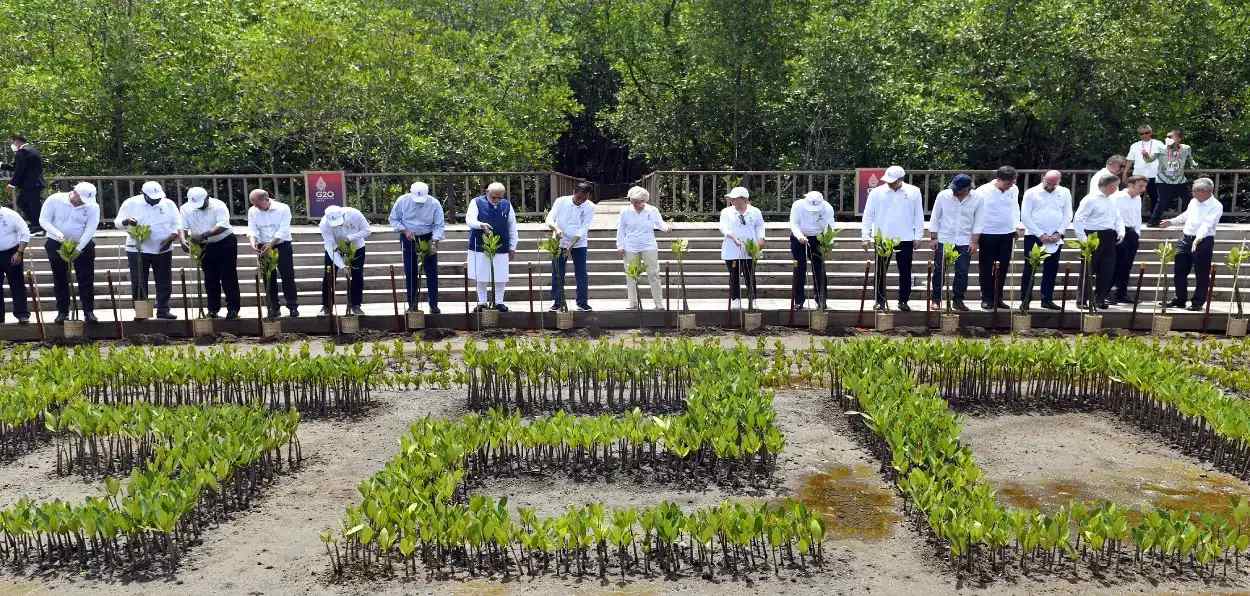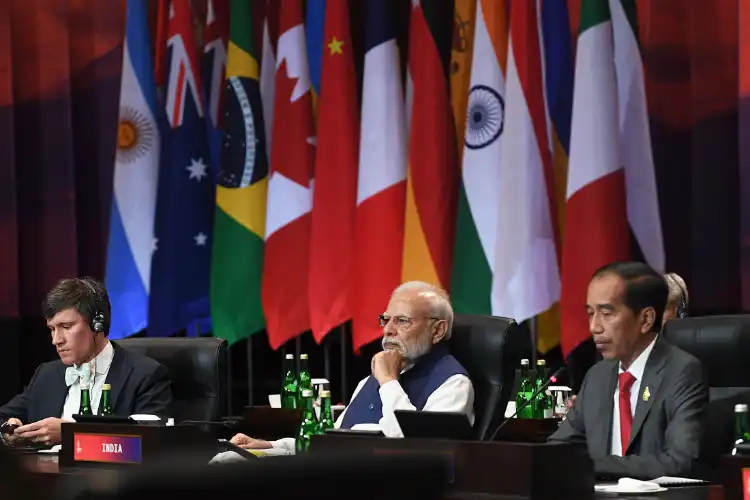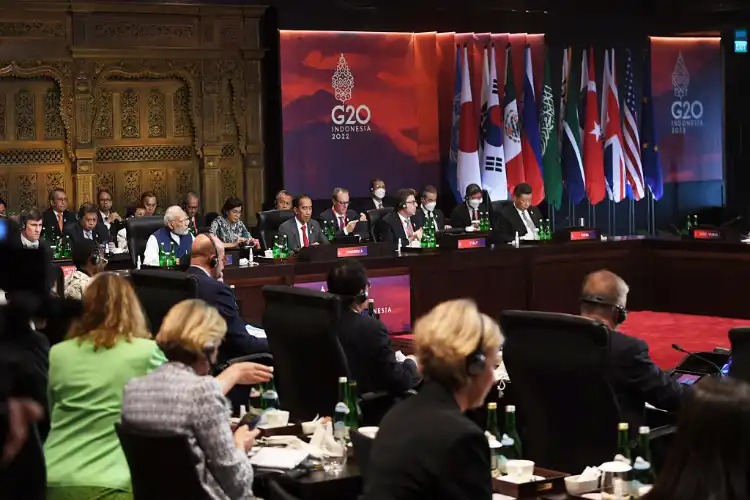
 Lakshmi Puri
Lakshmi Puri
Organizing the mega event of the G-20 Summit is an all-India initiative, by all organs of the government and the people of India. Prime Minister Narendra Modi feels that it is a 'work' to be celebrated by all of us. This conference will increase India's soft and hard power. There will be immediate and long-term benefits in the form of trade, investment, tourism, and technology growth.
All these will be incidental benefits of this conference. However, the region known as the Global South is home to two-thirds of the world's population struggling to survive. All these people - all mankind - are one family, and we all have one future - Vasudhaiv Kutumbakam, with the noble spirit that we should promote the progress of 134 ambitious, developing nations in the region, PM Modi has invested so much in this initiative.
The G-20 is the most influential grouping of the Southern and Northern Hemispheres aimed at economic and financial cooperation. The member countries account for 85 percent of the world's GDP and 75 percent of world trade. Scattered across all continents, 60 percent of the world's population lives in this group. The power gained as a convener and decision-maker of the group to make the norms of global governance more suitable to the needs of developing nations, as well as to be designed in India; But India intends to use it to shape global solutions and viable transformative decisions that are acceptable to the entire G-20 group.
India under the leadership of PM Modi has never been more important to the interests of the world, especially the developing nations of Asia-Africa-Latin America, and the Caribbean region.
As a civilized nation, the world's oldest and largest democracy, the most populous country, the fastest growing and soon to be the third largest economy in the world, and aiming to become a developed nation by 2047, India's significance is unique.
India's footprints in the economic and security sectors are becoming more and more established at the regional as well as the global level. It also includes our tripartite partnership with the Global North. Under PM Modi's leadership, our journey has now shifted from the 'power of argument' to the 'argument of power' in dealing with issues facing the 'Global South' in a collaborative manner.
Under the five humanitarian projects of the beginning of this century, accepting unprecedented responsibility in the distribution and regulation of Global Public Goods (GPG) and paying our financial share immediately, we are moving towards becoming a country that not only shapes the existing system but also creates a new system.

Prime Minister Narendra Modi with Indonesian President at the Bali Summit
These systems include peace and security, sustainable development and action programs related to climate change, democracy and human rights, humanitarian and disaster response, and '4.0 technology'.
Nations in the 'Global South' are facing a barrage of crises. Many countries are even collapsing simultaneously. The devastating epidemic of COVID-19, climate change, the Russia-Ukraine war, the backsliding of the Sustainable Development Goals (SDGs), rising poverty, deflation-depression syndrome, and the debt crisis that has crossed the nine trillion-dollar mark are some of the major crises that have thrown the world into turmoil. Besides the rising prices of food, fuel, and fertilizers and disruptions in global supply chains are troubling countries.
India has taken up these issues on a priority basis during its 'G-20' presidency. These are as follows: Addressing the Sustainable Development Goals; dynamic, inclusive, and adaptive development; Environmentalist lifestyles; financing for green development and the environment; Technological transformation and digital public infrastructure; Women-led development and multilateralism for the twenty-first century – including addressing the three Fs, debt crisis and future pandemics, as well as natural disaster prevention.
Some processes, activities, programs, funding, and provision to support the 'Global South' in the above-mentioned areas by seeking the conscious cooperation of the developed nations of the 'Global North' in the 'G-20' and reforming the multilateral institutions mainly under their economic and political control. India is trying to build the necessary action mechanism.
India will also provide its mentor projects in these areas so that these nations can start similar projects and scale them up in the future.
In general, India wants to reform multilateral affairs on behalf of the 'Global South' and for itself. It also includes the expansion of the UN Security Council, the highest body that seeks to end wars and promote peace.

A session of the G-20 Summit in progress in Bali, Indonesia
It is India's objective that major developing countries and continents, which have been unfairly sidelined so far, should also be included in this committee.
Improving the quota and voice mechanisms of low and middle-income developing countries in institutions such as the International Monetary Fund and the World Bank to increase the participation and leadership of low- and middle-income developing countries in key global financial and monetary decisions; Recapitalization of multilateral development banks to provide concessional financing for the Sustainable Development Goals (SDGs) and climate change mitigation and adaptation; Increase the resources of the International Monetary Fund by creating a new SDR formula that can effectively respond to disasters; India also wants to reform the WHO to make pandemic preparedness and response faster.
At the Voice of the Global South Summit, PM Modi announced that 'Your voice is India's voice', and 'Your priority is India's priority'. This slogan seems to be echoed in everyone's mind now.
On behalf of the small islands in the Pacific region, the Prime Minister of Papua New Guinea hailed him in May 2023 as a 'leader of the Global South' and pledged to stand by him on the world stage. Later, India's strong push for inclusion of the African Union, the largest regional organization of the Global South, into the G-20 was a strong push for inclusiveness.
Getting the G-20 to agree on its ambitious agenda in a volatile geopolitical environment was a daunting task; But with the spirit of 'Ek Bharat-Shreshtha Bharat', the all-powerful efforts of the whole of India - even in these troubled times, beset with difficulties - as symbolized by India's presidential career, there is hope that the lotus of universal unity and unhindered opportunities will blossom for all the nations and mankind of the world.
Most importantly, as per Mahatma Gandhi's stance of 'From Sarvodaya to Antyodaya', those who are most downtrodden will now be given a hand to rise. Alternatively, as per the UNO's pledge in the 'Sustainable Development Agenda 2030', the principle of 'most disadvantaged first' will be followed everywhere.
(Lakshmi Murdeshwar Puri is a former Ambassador, former Assistant Secretary General of the United Nations, and former Deputy Director of the UN Women's Department.)
